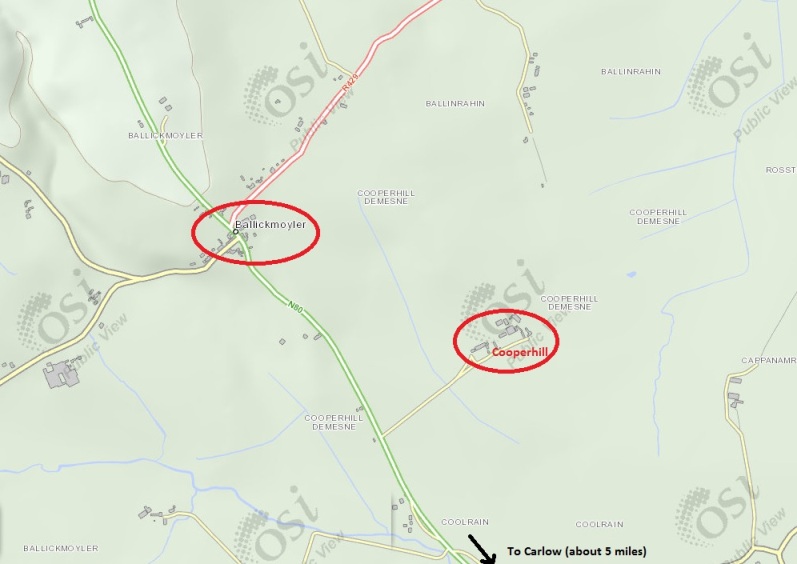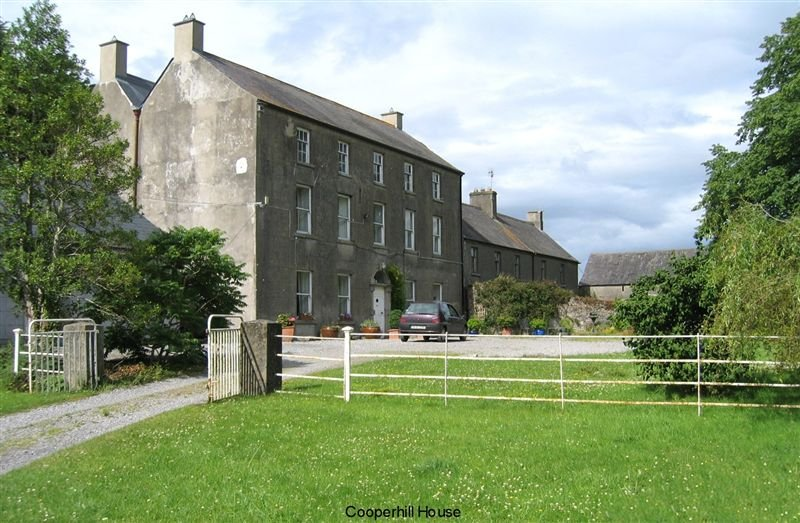Cooper Hill DemesneBack to The Coopers of Coopers Hill Thanks to Michael Brennan and his Brennan Family History site for a lot of this information about the Coopers. The Bowles family of Ballickmoyler, Queens co. (now co. Laois) would have been tenants of the Cooper family for over 100 years.
We don't know when the Bowles arrived here or where they came from yet for certain but they were here by the early 1700's. The discharge papers for Michael Bowles, a sergeant in the 29th Foot Regiment in England, shows that he was born about 1744 in Killaban parish near Carlow town. The Coopers centred their own estate,
Cooper Hill Demesne, on Cooper Hill about 1 mile southeast of Ballickmoyler
village and 4 miles north of the town of Carlow. The "big house"
on Cooper Hill was built about 1717 and was added to later but the front
section of the current house, including the original front door, dates
to that time.
Extract from General View of the Agriculture and Manufactures of the Queen's County, Drawn up in the Year 1801 for the Consideration and Under the Direction of The Dublin Society by Sir Charles Coote, Bart., Dublin 1801; p. 13 (a report of the status of the parishes in Queen's county made by "An inquisition taken at Maryborough the 13th of October 1657, before Sir Charles Coote, Knight, baronet, President of the Province of Connaught, Henry Gilbert, Robert Preston, Raphael Hunt, Henry Owen, Francis Barrington, Thomas Pigot, William Scot, John Rawlins, Gilbert Rawson, Henry Lestrange, and William Weldon, Esqrs., Commissioners appointed and authorized ... for the uniting and dividing of parishes, ordering and placing of churches, erecting and endowing of free schools, ..." "32: Killebane (in Slewmargy) hath thirty eight townlands, is an entire rectory, in 1640 worth £200 per annum, now £60, and hath three acres of glebe. The commonwealth receives the profit. The Lord Protector is the patron. It hath a church, which is within five miles of the remotest part of the parish. No Minister." 41. Killeshin (in Slewmargy) hath twelve town lands, and is an entire rectory, was in 1640 worth £100 per annum, now worth £40. The commonwealth enjoys the profits. The church at Killeshin, in ruins, about two miles distant from the furthermost part of the parish. No minister." p. 184 General Subjects: "This country is very populous, remarkably so about the collieries. Ballickmoyler village, the estate of William Cooper, Esq. and just contiguous to Cooper Hill, is the only one in the barony, half of which has been in ruins since the rebellion, but is now repairing; it has a patent for two fairs, and a weekly market, the latter little frequented, since the times grew disturbed. The houses in the village are tolerably good and comfortable, but from this to the collieries they are very wretched. The fuel through all this country is stonecoal; the clothing is a remarkable coarse kind of frize, but warm; potatoes and oatmeal their food." p. 187 "Mr. Cooper's seat has also been well wooded; he is yet extending his plantations with great taste and judgment. The demesne contains one hundred and thirty acres of the richest land, so luxuriant that it cannot be appropriated to tillage. Considerable ornamental improvements have been made by the present proprietor; the prospect of the adjoining county of Carlow, and all the fine demesnes there, with Carlow town and the surrounding mountains, are seen from the front windows, and comprize a view of as rich a country as can be presented to the eye." p. 188 "It is worthy to remark, that in this rich and extensive barony there is not one parish church now existing; there is service each week alternately at Balickmoyler, and at the Rector's house at Sheffield near Ballylynam: a very numerous congregation attends from the collieries." The last descendants of the Coopers of Coopers Hill family were killed fighting in the First World War after which the estate and the house fell back into Catholic Irish hands. Today the Brennan family lives in The Big House and farms the estate, although with somewhat less land than the original owners. |

